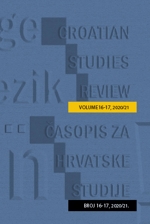New wave of emigration from the Republic of Croatia
New wave of emigration from the Republic of Croatia
Author(s): Rebeka Mesarić ŽabčićSubject(s): Migration Studies, EU-Accession / EU-DEvelopment, Asylum, Refugees, Migration as Policy-fields
Published by: Croatian Studies Centre
Keywords: Croatian emigration; emigration; migration; Republic of Croatia;
Summary/Abstract: The paper deals with the recent emigration of the population from the Republic of Croatia. The entry of the Republic of Croatia into the European Union, on 1 July 2013, increased emigration to many countries of the European Union with simplified procedures of emigration. Attractive and repressive factors stimulate and trigger new emigrant waves outside Croatia towards European Union. Most of the emigrates are young people, whole families, people of fertile age, working active population, highly educated and people with professional qualifications, i.e. anyone who can find employment outside Croatia. Permanent emigration already leads to imbalances and shortages of workers in some sectors of activity such as hospitality, transportation, medical profession etc. Although employment growth has been registered in January 2018, unemployment remains high. Employment growth does not mean a simultaneous drop in unemployment. It is to be assumed that high unemployment remains one of the consequences of emigration that takes on worrying proportions. The media discourse emphasises that people emigrate for personal reasons, in cases when they either have no job or cannot progress in their jobs, along with other known factors of emigration that are a key problem for the Croatian society. The loss to Croatian society resulting from the permanent emigration of the population can best be described as inadmissible in the broadest social context. The ‘brain drain’ has always been present. The most educated, most ambitious will always look for opportunities for advancement and training in their profession. Experience has shown that highly educated and qualified specialists are a type of modern nomad because they move to improved working conditions and use the opportunities for advancement. The consequences of emigration are long-term for the Croatian society and predictions for the future are not optimistic if something is not changed as soon as possible. The facts related to and consequences of this last wave of emigration for Croatian society are just some of the issues and reflections that will be considered in this paper.
Journal: Croatian Studies Review - Časopis hrvatskih studija
- Issue Year: 2021
- Issue No: 16-17
- Page Range: 87-101
- Page Count: 15
- Language: English

